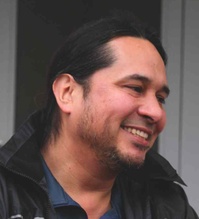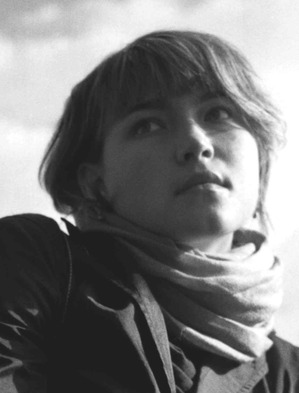By Marc Dadigan
At a certain glass factory in Fargo, North Dakota, more than half the workers are Sudanese, Bosnians, Cambodians and there are refugees from around the world. They work and earn their wages side-by-side, learning each other's languages, sharing their culture and forming a living embodiment of the melting pot.
 For UO anthropology doctoral student Jen Erickson, scenes like this are utterly fascinating, especially since they didn't exist in Fargo up until 15 to 20 years ago when streams of Bosnian refugees and later Sudanese started settling there to escape strife in their war-torn homelands. Whereas refugees had long been settling in so-called "gateway cities" such as New York, Los Angeles or Minneapolis, Erickson says more small towns have become refugee destinations since the early 90s.
For UO anthropology doctoral student Jen Erickson, scenes like this are utterly fascinating, especially since they didn't exist in Fargo up until 15 to 20 years ago when streams of Bosnian refugees and later Sudanese started settling there to escape strife in their war-torn homelands. Whereas refugees had long been settling in so-called "gateway cities" such as New York, Los Angeles or Minneapolis, Erickson says more small towns have become refugee destinations since the early 90s.
"In bigger cities they can kind of fade away into the background, but when a Sudanese walks down the street in Fargo, people notice. That's why I wanted to do my work in a smaller town," she said. "The impact of these refugees is so much bigger."
Joseph Makeer, a Sudanese Lost Boy, came to Fargo in 2003 as a refugee. He has since set down roots, started a family and received a college degree. Photo: Deb Dawson
Gripping Tales of Survival
A native of small-town Minnesota herself, Erickson spent the 2006-2007 academic year immersing herself among two completely disparate groups of refugees in Fargo: the Bosnians, many of whom were Roma, and the Sudanese, including several of the Lost Boys who've gained fame around the world for their gripping tales of survival. Her research focused on how the two populations navigated the strange cultural terrain of their new home and how Fargo, a town that had almost always been predominantly white and Christian, tried to absorb them.
"I found that culture trumped race," she said. "The Bosnians are a more insular people and less engaged with the community. In contrast, the Sudanese place a high value on education, and they're extremely open about their stories and grateful to be in Fargo. "They fit better with the local people's idea of good citizenship."
Her dissertation, which she's currently drafting, is a voluminous comparative study, exploring not only how two distinct cultures acclimated differently but also how they were aided by private and public service agencies.
A Worthy Citizen
At the heart of the study is the question of what it means to be a worthy citizen and how that dovetails with assimilation and issues of cultural repression.
The example Erickson uses to demonstrate this complicated cultural tango is that of a tireless volunteer she knew in Fargo. Dedicated and caring, she was on a personal crusade to help the Lost Boys become economically self-sufficient, a pillar of the American (and Fargo) sense of good citizenship.
She would help them at their homes and take them places, Erickson said, but whenever she would see them she would insist that they speak only English.
"Her heart was in the right place, and the Lost Boys would have been in trouble without volunteers like her," Erickson said. "But, you know, telling them to speak English in their own house, insisting on this sense of having to assimilate as quickly as possible, that's a form of cultural disrespect."
Erickson made the nearly heretical decision to do her anthropological work in her own backyard rather than travel overseas like many of her colleagues.
"Part of the reason I chose to work in Fargo is because I want to challenge that paradigm of anthropologists traveling to do fieldwork," she said. "With globalization and immigration, the people that anthropologists traditionally worked with aren't living in small, faraway isolated enclaves; they're living among us. They are us."
To collect data about the interactions among refugees and social services in Fargo, Erickson conducted more than 60 interviews, about 80 hours total, with Sudanese, Bosnian and Bosnian Roma refugees as well as volunteers, workers at the resettlement agency and at the county welfare office.
About 95 percent of the local social workers were white, Christian women whereas many of the resettlement workers were former refugees. In general, Erickson says, the type of citizenship that was being promulgated by the workers was based on economic self-sufficiency, religious piety and giving back to the community
And They're Nice
It was far easier for the Sudanese to earn local acceptance because many of them are Christian. Several already spoke English before arriving and, though they arrived with fewer marketable skills than Bosnians, they've shown a dedicated work ethic and passion for education.
"And they're nice, and that means a lot in the Midwest," Erickson said with a laugh. That doesn't mean the Sudanese don't also struggle. While some forge birth certificates so they can earn a high school diploma, many are unable to get access to college for financial and academic reasons, an unending source of frustration for them. And there are tensions within the community because the Lost Boys are very open about sharing their tragic stories of survival with local groups, which means they often get more attention and care than other Sudanese. This causes some bitterness and resentment.
"But overall they're so grateful to be here, and they love it because it's safe and quiet and there's a sense of security," Erickson said. "At the same time, they don't like to talk about certain issues like racism. To them, the racism they deal with here isn't a problem because it can't compare to what they faced in Sudan."
Any issue they face here in America can be downplayed by simply saying it was much worse in Sudan, she says.
The non-Roma Bosnians are the most successful of the refugees, Erickson says, in large part because they came from an industrialized country and had more marketable skills upon their arrival. But they're not as inviting and eager to intermingle as the Sudanese.
The Roma, however, have traditionally placed the highest importance on marriage and family as a way to sustain their culture, and thus many of their children marry young and drop out of high school. Historically, they're also often distrustful of government agencies, such as schools, which can decrease their access to vital rights and social services.
"If you're a refugee who's not overtly grateful, you're seen as a less worthy citizen, you have less clout, less respect and less access to services in general," Erickson said. "The welfare workers are kind of at their wit's end with the Roma."
Activist Anthropologist
Erickson considers herself an activist anthropologist, which means she strives to design her research to be helpful to the people she's studying. Yet with so many moving parts in her Fargo project, it would be almost impossible to please everyone no matter what conclusions or recommendations she makes.
At the very least, it's her hope that she can serve as a cultural translator, someone who can help to untangle the cultural web of America's increasingly diverse and exotic small towns.
"It is like translating a language," she said. "You can't just do it word for word, using a dictionary. There's an art to it, being able to explain the particular traits of a culture so other people can understand."
This was a mission that began for Erickson, surprisingly enough, with a rejection letter from the Peace Corps, which wasn't willing to insure her because of diabetes. Determined to live abroad and learn a language, she eventually found a nongovernmental organization that sent her to Bosnia to work with women who had been victims of violence during the war. She later got a job working with Bosnians at a refugee resettlement agency in Sioux Falls, South Dakota in 2001, around the same time the Lost Boys first began arriving.
"The more I learned about the Sudanese, the more I was appalled about how little I knew about what was happening there," she said. "So part of my work is always trying to raise awareness."
With her background as a case manager and her contacts in Sioux Falls, she figured it would be easy to start her research as a graduate student. But people in Sioux Falls doubted her ability to be objective because of her ties to the community, so she relocated the project to nearby Fargo -- but then she was somewhat shocked by the suspiciousness she encountered from the refugees.
"I was a bit naive about that. They tend to think that you're like a spy," she said. "They'd always be asking, 'Why are you writing that down?'"
Yet, like any skilled practitioner of immersion, she earned their trust by hanging out, attending church services and gatherings, offering baked goods and good humor, she says.
"A lot of it was just time, letting them get used to seeing my face around," she said. "I'd hang out at the Bosnian grocery store a lot. I'd go to weddings and Sunday service with the Sudanese. I'd bake or cook for them. But mostly I just kept hanging around."
Erickson makes her acceptance sound like a simple inevitability of time, but it's clear she has a unique talent for traversing the multicultural landscape. And this puts her in a position to weave a raw and real retelling of the refugee story in America.
"Part of the reason people love the Lost Boys' stories is because it's the classic American dream: The happy ending of the U.S. rescuing these refugees from a hard life, and look at how great we are and how they all lived happily ever after.
"But the reality is more complicated than that."

From the War Zone to Fargo
Online Extras
Sing Along With A Mt. St. Helens Ballad
 When the volcano erupted, a UO professor discovered that local residents consoled themselves through song.
When the volcano erupted, a UO professor discovered that local residents consoled themselves through song.
What's Your Story?
 Where were you on May 18, 1980? Got a Mt. St. Helens tale to tell?
Where were you on May 18, 1980? Got a Mt. St. Helens tale to tell?
Suspended Animation
Watch Mark Roth's talk on "hibernation on demand" at the recent TED Conference.Peer Into Alan Alda's Brain
 Join UO neuroscientists as they bring the host of the PBS series, The Human Spark into their brain research lab.
Join UO neuroscientists as they bring the host of the PBS series, The Human Spark into their brain research lab. Autism and Animals
 Temple Grandin, perhaps the world's best known person with autism, drew an overflow crowd to her UO talk.
Temple Grandin, perhaps the world's best known person with autism, drew an overflow crowd to her UO talk.
Once In a Lifetime
 That's how Roger Jacob describes his chance to study his tribal language, Sahaptin, with Yakama elder Virginia Beavert.
That's how Roger Jacob describes his chance to study his tribal language, Sahaptin, with Yakama elder Virginia Beavert.
From Chechnya, With Love
 Watch a slideshow about Elena Rodina's journalistic globetrotting, from the Arctic Circle to Cuba.
Watch a slideshow about Elena Rodina's journalistic globetrotting, from the Arctic Circle to Cuba.
